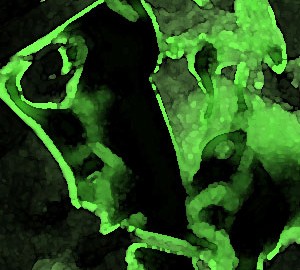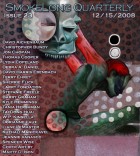The narrator in this piece is characterized as an everyday man, someone “stuck on Earth,” part of the “wave of brotherhood.” What was your motivation to write about someone so “ordinary”? Do you see the protagonist of this story as one person or many?
That’s a great question and I like your reading of the character and the story this way. I didn’t set out to write an “everyman” piece, but the Apollo 8 moon mission itself brought a sense of oneness to the planet and, therefore, to the story as well. The protagonist is like many of us, I believe, particularly in the midst of significant events, in that he is caught up in a moment larger than himself, which, in turn, makes him feel special, a part of something. While there are certainly exceptions, I believe most of us want to be a part of something good, something great beyond our immediate orbit, which often comes from a sense of a shared humanity. Isn’t that one reason we read—to enjoy those moments of common understanding? If the moment is affirmative, like Barack Obama delivering his acceptance speech in Chicago before thousands, then we want to share in that affirmation of good will. If the moment is tragic, like 9-11, then we need each other to feel better about the planet that threatens to tear us apart. I did not experience the Apollo 8 moon mission, but everything I know of the event suggests it was one of those affirmable moments, in what was an otherwise tragic year. I liked the idea of everyone on Earth looking up at the sky together, for once looking beyond themselves at something greater than the individuals. So, in that sense, the protagonist is more akin to the “many”. One thing fiction does so well is to seek out and illuminate the universal in the unique. And, though this story is quite short, I still believe there is an element of the individual, if only evoked through the setting and a few concrete details.
What role does the desire to be remembered play in this piece? in your other writing?
The implication in the story of a desire to be remembered might represent my own personal struggle with the idea of death as a vanishing consciousness—albeit a solipsistic notion of death, since the disturbing aspect of death for me is about my own loss of consciousness, my own candle snuffed out. More likely, however, is that it also goes back to the first question/answer, i.e., our desire to contribute to something larger than ourselves. Or to embrace a writing metaphor—a desire to be read, to put our voices out there in the ether.
As for my other writing, I see a pattern of characters who desire to craft/tell their own story, to control and order the chaos they perceive their lives to be. With this pretense of control, we feel better. Otherwise, we end up like Yeats’ falcon, spiraling upward in a winding gyre, the center collapsing—while I know some people who embrace and thrive on that kind of anarchy, I believe most of us need to believe that we control our lives, even if we, deep down, believe the opposite.
Your story is particularly rich in sensory details: people, music, food, drinks, lights, weather. How do you decide how much detail to include? What makes a detail worth being included, especially when flash fiction demands such a tightness in form?
For this piece, I started with the deck and the snow, the burgers and rum punch, the pineapple lights and summer music, which all serve as a sort of objective correlative for the fellowship / kindred spirit those characters share in that brief moment. I liked the idea of establishing tension by juxtaposing the ordinariness of the party—itself at odds with the environment—and the extraordinary spirit of the moon landing.
I tend to overwrite a scene first, then pare it down to the essentials—just what’s needed to evoke the emotion I’m after. For “Earthrise,” I can’t imagine the story without the silvery sky, snow, lights, Toots or The Beach Boys. The best flash fiction for me is that which focuses on and illuminates an instant by shining the light on a few concrete details, whether commonplace or extraordinary, that evoke lifetimes. I love the Steve Almond story, “When the Toasts Stopped Being Funny,” in SmokeLong Issue 18. It’s only about one hundred words, but in an instant it presents anonymous lives made real.
You stories have appeared or are forthcoming in some amazing publications. You were a founding editor of New South. What’s next for you as a writer? Are you working on a collection or on a longer piece of work?
This is a dangerous question to ask a writer. And I’ll happily indulge myself a bit. I absolutely love the short form and would love to write more flash fiction, especially as the form gains greater recognition and a broader audience with the rise of online publications like SmokeLong and others. I believe the Internet has democratized, somewhat, literary publishing. How this plays out for publishing at large remains to be seen.
I’ve got a couple of collections of longer short fiction, one of which is linked thematically, and a novel for which I’m writing the final chapter. One of the collections involves a lifelong fascination I’ve had with The Beatles phenomenon and the legacy of not only music but also mythology that continue to permeate popular culture and, indeed, some of my work. In I WANNA BE YOUR FAN I’ve exploited the motif of The Beatles to try to capture the spirit of this social/cultural phenomenon, while also illustrating simple human dramas. The collection employs metaphorical as well as physical connections to the myth, music and celebrity of The Beatles. However, the stories are not “fan” fiction or fiction devoted to representing the artists’ lives—i.e., these are not stories about The Beatles, but use the images and historical context of The Beatles as a theme (think more along the lines of A.S. Byatt’s Matisse Stories in which Matisse paintings appear as a part of the landscape in each story). I’ve published a few of the stories in magazines and journals. In fact, one of the stories, “For the Love of Mary Hooks,” is forthcoming in Ellery Queen Mystery Magazine (May 2009). The story concerns a young boy, known for his Beatles hairstyle, in small-town Georgia circa 1966, who is found dead along the railroad tracks with his hair cut short. My first mystery. And now that I’ve had a taste of it, I want to write more.
The novel BIG IN JAPAN, which I’ve just finished, is a satire of celebrity set primarily in the mountains of central Japan, where I lived for several years. The novel chronicles the struggles of American Kent Richmond, has-been gaijin-tarento (foreign talent) on Japanese television, after the loss of his celebrity and the disappearance of his wife. The book alternates between tabloid articles, letters, YouTube video, excerpts from an unfinished memoir, manga story boards, botched interviews, notes scribbled on napkins, and the primary text, a third-person narrative.
I’ve had a lot of fun, too much it sometimes seems, crafting the novel. I’ve had a particularly good time researching this book and exploring the various ways in which a story can be told and how this affects a character’s identity. The book again represents my interest in how we attempt to tell and control our own story. It also illustrates my fascination with the cult of personality.



 The core workshop of SmokeLong Fitness is all in writing, so you can take part from anywhere at anytime. We are excited about creating a supportive, consistent and structured environment for flash writers to work on their craft in a community. We are thrilled and proud to say that our workshop participants have won, placed, or been listed in every major flash competition. Community works.
The core workshop of SmokeLong Fitness is all in writing, so you can take part from anywhere at anytime. We are excited about creating a supportive, consistent and structured environment for flash writers to work on their craft in a community. We are thrilled and proud to say that our workshop participants have won, placed, or been listed in every major flash competition. Community works.